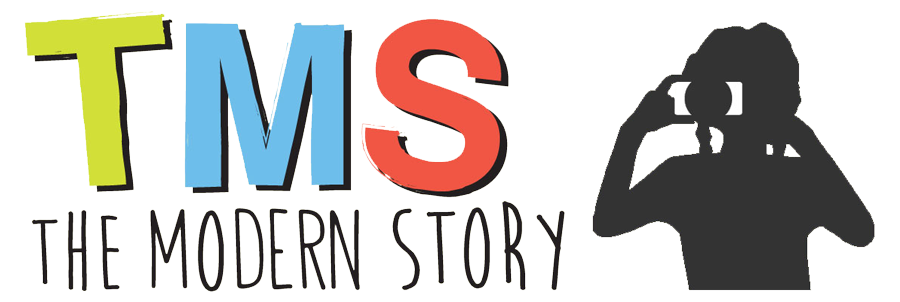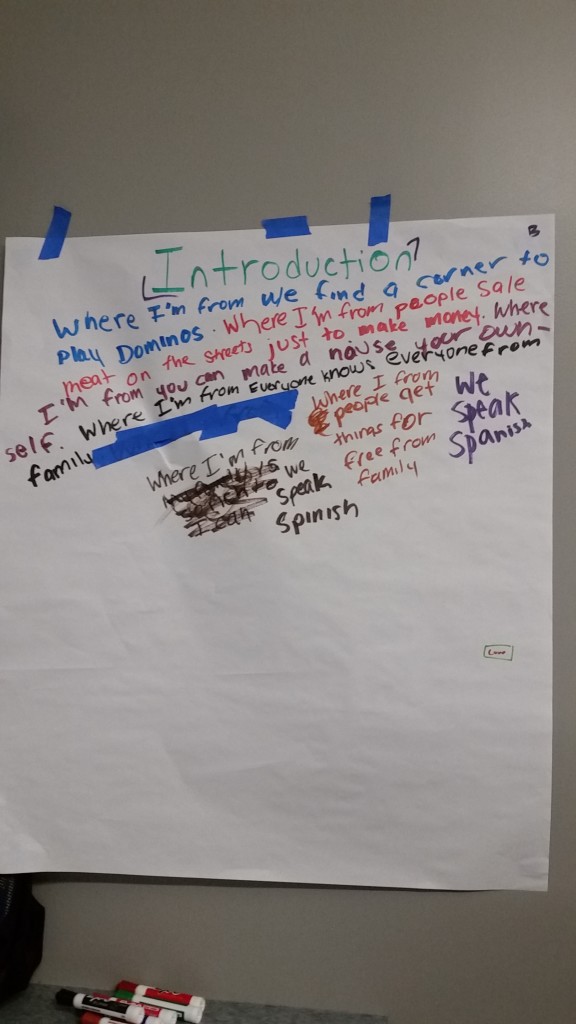Ending & Beginning
This past week was our final one working with our TMS Boston scholars in the Computer Clubhouse at the South Boston Boys and Girls Club. On Monday and Thursday, we held our final classes of the workshop, and on Friday we hosted our finale showcase, where our scholars had the opportunity to share their completed “Where I’m From” digital stories with their fellow Club member peers, with Club staff and administrators, and, most importantly, with their family members who were able to attend the showcase.
Our scholars spent the final two classes in post-production, working with Fellows and interns on taking their digital content and editing and organizing it all into a final product in iMovie. After reviewing each others’ draft versions of their digital stories, scholars provided each other with feedback on how they could improve their stories. All of the scholars’ agreed that their stories could benefit from more scholar-produced imagery, and so we worked together as a TMS team (scholars and Fellows and interns alike) to take photos and videos, with everyone rotating the responsibility of being the camera operator or the director or an actor. Once these last acts of production were finished, scholars focused the rest of their class time (as well as some of their free time outside of class) in post-production. Fellows and interns worked with scholars to help them learn the intricacies of iMovie, and slowly but surely each scholar’s digital story came together. By the end of class on Thursday, our scholars had completed their “Where I’m From” digital stories, and were ready to share them with the world.
The next day was the finale showcase, and each scholar arrived early for TMS class. It was evident to all of us that they were both excited and somewhat nervous to share their digital stories. We had each scholar cue up their digital story on separate iMacs on different tables in the middle of the Computer Clubhouse. We discussed how scholars should introduce their stories, and encouraged them to share with their audience about the process they went through in making their digital stories as well as what they learned in doing so.
At 3:00 pm, one scholar’s father and another scholar’s grandmother arrived right on time for the showcase. We explained to them that they could view their scholar’s and the other scholars’ stories at that time, but that we would wait for more audience members to arrive in order to share all of the stories at once. Thus, in the meantime, we would encourage visitors to view scholars’ stories in a “gallery walk” fashion at their leisure. The scholar whose grandmother had arrived first wanted to wait for his father to be present to show his story, and so his grandmother graciously respected his wish and waited. Over time, some Club members and staff filtered into the Computer Clubhouse and rotated to each scholar’s table and watched their digital story with them. Our scholars did a great job of explaining the genesis of their stories and the process they went through in making them. By around 3:45 pm, we reach a critical mass of audience members in the room, including South Boston Boys and Girls Club leadership and the father of the scholar who was anxiously awaiting his arrival. At that time, I asked for everyone’s attention and welcomed them to our TMS finale showcase. I explained what TMS does as an organization, as well as what our scholars did over the course of our workshop. Then, each scholar was presented with a certificate by a Fellow or intern who had worked closely with them on their digital story. And finally we held a mass viewing of each scholar’s digital story.
The last story to be shown was that of the scholar who had his grandmom and his father in attendance. I could tell that he was both excited and anxious to show his story. Even I was somewhat anxious, as I knew that the scholar shared some very personal things about his family, and his dad in particular, in his story. What made me slightly nervous was when the scholar speaks about his father’s occupation as an electrician, and how his father has always pushed his son to do something “more than” being an electrician. The scholar speaks eloquently and powerfully about how his father and mother want what is best for him, and want him to succeed, and don’t want him to struggle in the same manner that they have had to struggle at times to provide for themselves and their family. I was slightly nervous because you can never truly tell how someone who is not completely familiar with digital storytelling will react when part of their story is being told by a loved one. I watched the family as they and the rest of the audience watch the digital story. From the very beginning, the scholar was sitting in a seat in front of the computer, and his father stood behind him with his hands on his son’s shoulders, while the scholar’s grandmom stood to their side. All three of them watched and listened intently throughout the story. When it came to an end, amidst the applause of the audience, the scholar looks up at his dad who was looking down at him. He told his son that he was proud of him and that he loved him, and he gave him a kiss on his forehead.
After the applause died and the crowd dispersed, the scholar took his father and grandmom into the media room to show them how he mad made his digital story. As he did so, I watched from afar. I was proud of him for telling his truth, and happy for him that he got to share it with his family that cares about so much, and who obviously love him beyond my ability to comprehend. I was proud of my scholars, each of whom had opened themselves up and given their all to their digital stories and to each other. I was proud of Franklin, Nicole, and Sam, and all the hard work they had put into guiding and supporting our scholars. I was proud of TMS, as much a movement as it is an organization, and one that has amplified the voices of youth near and far.
But what I felt more viscerally than any other emotion was a simple but powerful awe. Awe at the stories of our scholars. Awe at the power of their stories. Awe at the power of storytelling – to create, to connect, to liberate.
And awe at the fact that while this moment was in many ways an ending, it was also a beginning.
And for that, I am beyond grateful.
Ever onward.
– Rich
Intern, Sam’s reflections on the experience of working with The Modern Story:
Since TMS was essentially my first job working with kids, it really taught me about the challenges and numerous benefits of this practice. It taught me that to work with kids you must put yourself out there and although that is difficult at points, you will see results and wonderful relationships form as a result. The Modern Story aims to get children to see themselves and their world through a different lens that they may not always have the opportunity to use. During my time with TMS I saw that this ability lies within all of the children we worked with and they simply needed someone to hand them the tools to express it.

